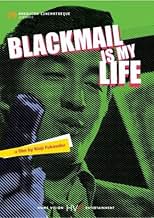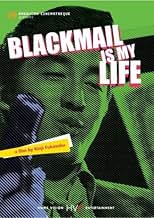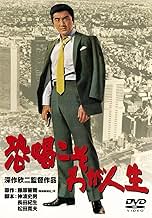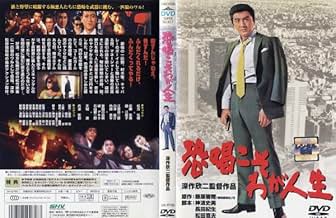Agrega una trama en tu idiomaA pungent, extremely entertaining tale of hedonistic, amoral blackmailer Matsukata.A pungent, extremely entertaining tale of hedonistic, amoral blackmailer Matsukata.A pungent, extremely entertaining tale of hedonistic, amoral blackmailer Matsukata.
- Dirección
- Guionistas
- Elenco
Opiniones destacadas
Blackmail Is My Life (1968)
Well, the bad guys (four men and one woman, all young and good looking) have a lot of fun, and carry a lot of poise. As rank amateurs they are lucky and, between racing around in their car, show a lot of cool style. It's 1968 in Japan, and it feels like maybe 1964 in the U.S., with people still wearing suits and looking good doing it.
Eventually, they get in over their heads, but we don't really worry at first. They often say vague things like, "We'll go ahead with out plan," but they never say what they are planning. And then the plan happens, and it's fast and jazzy, in a kind of extended television way. The plot is kind of interesting, digging into the underworld of Japan in this sideways fashion. And visually it's fun, very nice wide screen compositions in a wide range of gritty Japanese locations. There is even a dramatic, spare electric guitar score, perfect for the period.
The more serious and deadly this movie gets, the more it loses it's lighthearted flaws. There is clearly (to me) an influence from Bonnie and Clyde (the previous year) with romanticizing bad guys and extended violence. There is some real poignancy built in, as well. There are lots of night scenes and dramatic lighting, and this has a late film noir kind of quality, somehow, dark and brooding between action scenes. If you don't mind some Japanese camp aspects, this might really make your night. And just a heads up: the second half is easier to like in a conventional way, even if the first half is more original and excessive.
Well, the bad guys (four men and one woman, all young and good looking) have a lot of fun, and carry a lot of poise. As rank amateurs they are lucky and, between racing around in their car, show a lot of cool style. It's 1968 in Japan, and it feels like maybe 1964 in the U.S., with people still wearing suits and looking good doing it.
Eventually, they get in over their heads, but we don't really worry at first. They often say vague things like, "We'll go ahead with out plan," but they never say what they are planning. And then the plan happens, and it's fast and jazzy, in a kind of extended television way. The plot is kind of interesting, digging into the underworld of Japan in this sideways fashion. And visually it's fun, very nice wide screen compositions in a wide range of gritty Japanese locations. There is even a dramatic, spare electric guitar score, perfect for the period.
The more serious and deadly this movie gets, the more it loses it's lighthearted flaws. There is clearly (to me) an influence from Bonnie and Clyde (the previous year) with romanticizing bad guys and extended violence. There is some real poignancy built in, as well. There are lots of night scenes and dramatic lighting, and this has a late film noir kind of quality, somehow, dark and brooding between action scenes. If you don't mind some Japanese camp aspects, this might really make your night. And just a heads up: the second half is easier to like in a conventional way, even if the first half is more original and excessive.
I noticed that IMDb lists this as a crime film AND a comedy. Well, there's nothing funny about the film--it's not at all a comedy. Instead, the film is about four low-lifes who make a career out of blackmailing people and fighting various mobs (who SHOULD have been able to smash them like bugs but somehow didn't throughout much of the film). For them, it all seems to be for the thrills and laughs--the money is secondary. However, the deeper the risk the greater the thrills--so they keep biting off more and more and more. You figure that eventually they'll get in way over their heads. And that is when their friend Zero (a black guy--which is quite unusual for a Japanese film) is killed, things look really bad for these bizarre anti-heroes.
While this film is quite different from the usual mobster film of the time, it still is a pretty ordinary crime drama. It was reasonably entertaining but no more. For those who like the genre, it's worth seeing--for others, probably not.
While this film is quite different from the usual mobster film of the time, it still is a pretty ordinary crime drama. It was reasonably entertaining but no more. For those who like the genre, it's worth seeing--for others, probably not.
This film essentially begins with a young man by the name of "Shun Muraki" (Hiroki Matsukata) working for low wages as a waiter at a nightclub. His life then changes when he is severely beaten because he happened to overhear his boss telling another employee how he cheats his customers by substituting cheap alcohol for more expensive brands. Having just recovered from his injuries, he then has a meeting with three trusted friends and together they decide to get even by blackmailing everyone who had a part in his former employer's scheme. From that point on, they all decide to continue their blackmail operation by going after suitable targets who cannot afford to have their indiscretions disclosed. What they fail to take into account, however, is that there are some targets who carry a greater amount of risk than they may be able to handle. Now, rather than reveal any more, I will just say that this turned out to be a pretty good film which benefited from generous amounts of drama, suspense and humor. Likewise, having two attractive actresses like Yoko Mihara (as Shun's girlfriend "Natsuko Mizuhara") and Tomomi Sato ("Otoki") certainly didn't hurt in any way either. On the flip side, however, I didn't especially care for the ending which, I believe, could have been done much better. Be that as it may, I enjoyed this film for the most part and have rated it accordingly. Slightly above average.
I really wanted to like this movie and for the first half hour it delivers. Interesting shots, flashbacks, cool stuff and innovative for the 1960s. Good backstory of the hero is shown, and interesting blackmail plot for the first 40 minutes. But then the writers and director lost focus, the plot got boring, and my urge was to turn the movie off. Now that's not a good instinct for a movie you want to like. I give it a 6 simply for the great beginning and interesting film style, but it could have been much better. Without this, the movie is below average, a 4 or 5. I do not recommend except for those interested in these kinds of movies, students, film buffs, etc. For most, this will be a big disappointment.
Blackmail is My Life is one of four films that Fukasaku produced in that year and once again affirms not only his brilliant visual style but the incredible energy of the whole crew that worked with him. You have to see this film wide on a big screen to see how beautifully it is shot and composed. It moves fast but the visual strategies show Fukasaku's control over his world and produce a great viewing experience before you even have to delve into the brutal world of Japanese low lifes and the power of the political world that exists at the time. This film fits in comfortably with other films of the time from all over the globe where power and politics were being critiqued and examined from every angle and genre available.
¿Sabías que…?
- TriviaTitle music, played several times during the film, is ripped off (different but substantially an imitation) from the 1966 Yardbirds' song "Over Under Sideways Down".
- ConexionesReferences Tôkyô nagaremono (1966)
Selecciones populares
Inicia sesión para calificar y agrega a la lista de videos para obtener recomendaciones personalizadas
Detalles
- País de origen
- Idioma
- También se conoce como
- Blackmail Is My Life
- Productora
- Ver más créditos de la compañía en IMDbPro
- Tiempo de ejecución1 hora 30 minutos
- Mezcla de sonido
- Relación de aspecto
- 2.35 : 1
Contribuir a esta página
Sugiere una edición o agrega el contenido que falta

Principales brechas de datos
By what name was Kyôkatsu koso waga jinsei (1968) officially released in Canada in English?
Responda





















